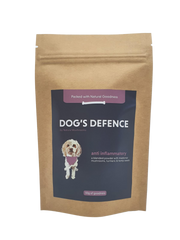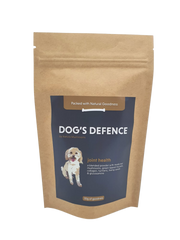Signs of arthritis in dogs
As the saying goes, with age comes wisdom.
But what also comes is grey hairs, sore joints and in some cases – osteoarthritis. And our dogs are no exception.
Affecting as many as 1 in 4 doggos, canine osteoarthritis occurs when the joint cartilage wears down, resulting in pain and inflammation. Like humans, there’s no known cure for canine arthritis. But thankfully, there are some steps you can take to increase their comfort.
So, whether you’re experiencing a limping Lab, a grumpy Groodle or a slow Shitzu – let’s look at the signs your dog has arthritis (and how you can help).

But first, what are the risk factors of canine arthritis?
Are you wondering whether your doggo is susceptible to canine arthritis?
Turns out, it’s not just a matter of chance, but certain factors can put them at greater risk. Things like breed, size, mobility, past injuries, age and weight all play a part – with larger, older or sedentary breeds more prone to canine arthritis.
5 signs of arthritis in dogs
Limping
Doggos limp for a whole range of reasons, and it doesn’t always point to arthritis. Archie could have pulled a muscle zooming, got stung by a bee or stood on a nasty prickle. The possibilities are endless.
The difference with limping caused by osteoarthritis is the gradual onset – often starting mild and worsening over time.
So, if your doggo is regularly limping – which worsens first thing in the morning and after exercise – it could be a sign your dog has arthritis.
They avoid jumping
Did your doggo once jump to the bed, couch or car without a second thought? But now, they avoid jumping all together (or persevere with discomfort so they can still enjoy those soft and squishy places).
Reluctance to jump, run or play could indicate sore joints, or be an early sign of osteoarthritis.
Walk shmalk
Have you tried shouting “walkies”, only to be met with a “meh” expression? Loss of interest in exercising is a common sign of arthritis. Not because they don’t want to spend time with you, but because it may cause them pain and discomfort.

They’re a grumpy pants
Behavioural changes are another sign of canine arthritis. Maybe they’re increasingly irritable, they don’t like being picked up or they growl at other doggos. Because let’s face it, you’d be grumpy too if you couldn’t jump and play like you used to.
Licking, licking and more licking
Our dogs love a good lick – whether it’s your face or another dog’s bum. But if they’re licking or chewing excessively in one particular spot, it could be because it’s sore from joint pain or osteoarthritis. Time to make a trip to the vet.
So, now we know the signs. What helps dogs with arthritis?
3 natural remedies for dogs with arthritis
The bad news? There’s currently no known cure for canine arthritis.
The good news? There are some simple, natural ways you can alleviate their pain.
So, let’s jump in (gently) and discover how to help your dog with arthritis.
Keep them active
One of the biggest risk factors for canine osteoarthritis is excess weight, which places pressure on their little joints. So, keeping your good boy or girl exercising as much as possible will help them stay limber and at a healthy weight.
In saying that, always try to tailor their exercise to their ability. Pushing them beyond their limits won’t do them any favours. Start with slow, gentle walks (and keep them on a lead if you need to control their urges to run, jump and splishy-splashy).
Create a comfortable environment
Maybe your dog’s food bowl is upstairs. Or they have to jump to reach the couch. Or perhaps their bed is so old and worn down, they might as well be laying on the floorboards.
Yep, the way your home environment is set up can either ease or worsen their condition.
So, begin by analysing their daily life and identify areas that might put a strain on their joints. Make sure their food and water bowls are accessible, install a pet ramp to the couch and buy the softest, squishiest bed you can find.

A healthy diet
Our doggo’s are what they eat. Feeding your best mate a natural, nutrient-rich diet can support their insides and relieve their symptoms. You can find a range of dog food and supplement options that are loaded with natural anti-inflammatories, like turmeric, hemp, glucosamine, ginger and green lipped mussels.
Hemp and green lipped mussels (in particular) have become the talk of the dog food town. They’re both rich in omega 3, an essential fatty acid that cannot be produced by your dog’s body, so they have to get it from their diet (which is the same in humans).
Omega 3 can reduce inflammation, support bone and joint health, maintain a healthy weight, increase heart health and so much more.
While it won’t cure arthritis, it certainly can relieve it.
And in the name of cute puppies, who wouldn’t want that?
At Dog’s Defence, we’re a team of proud paw parents and mushroom farmers. We combined our two passions and created a range of nutritious dog supplements that turn tail wags into full body wiggles. Our anti-inflammatory and joint health blends are made using a range of medicinal mushrooms, as well as other anti-inflammatory foods like turmeric, hemp, green lipped mussels and glucosamine.


Resources and further reading:
